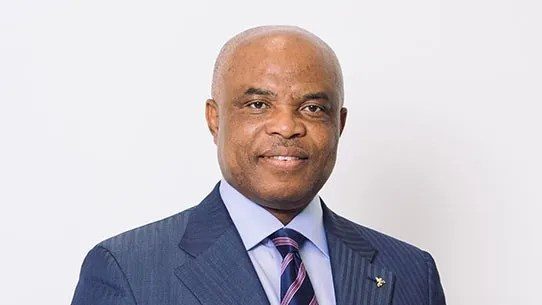Sterling HoldCo Reinforces Strong Earnings Momentum with 127% Profit Growth
Sterling HoldCo Reinforces Strong Earnings Momentum with 127% Profit Growth
Kayode Tokede
Sterling Financial Holdings Company Plc has announced its unaudited financial results for the nine-month-period ended September 30, 2025, posting an impressive 127 per cent year-on-year growth in profit after tax to N62.3 billion.
The performance is testament to the Group’s robust earnings capacity, operational efficiency, and disciplined execution.
The group’s gross earnings rose by 44.1% to N341.7 billion (September 2024: N237.2 billion), driven by solid performances in both interest and non-interest income lines. Interest income grew by 38.7% to N262.4 billion, supported by an expanded earning asset base, while non-interest income surged by 65.1 per cent to N79.2 billion, reflecting the group’s continued success in diversifying its revenue streams.
Sterling HoldCo maintained a healthy balance sheet, with total assets rising by 15.5 per cent from N3.54 trillion in December 2024 to N4.09 trillion in September 2025, driven by growth in loans, investment securities, and liquid assets. Customer deposits also grew by 14.3 per cent to N2.88 trillion, while shareholders’ funds increased by 32.9 per cent to N405.5 billion, up from N305.2 billion in December 2024, highlighting the Group’s solid capital base and its capacity to sustain future expansion.
Commenting on the results, Group Chief Executive, Sterling Financial Holdings Company Plc, Yemi Odubiyi, said: “Our performance over the first nine months of 2025 demonstrates the strength and adaptability of our Group structure. The significant growth in profit after tax underscores the success of our strategy to operate as a diversified financial services Group delivering value through both our conventional, non-interest banking, and asset management subsidiaries.
“Our results highlight disciplined risk management, innovative product delivery, and an unrelenting focus on sectors that drive real economic impact. We are equally grateful to our shareholders and the investing public for their confidence in the group, as reflected in the resounding success of our recently concluded public offer of 12.58 billion ordinary shares. As we continue to invest in technology and operational excellence, our goal remains clear: to build a resilient institution that consistently delivers sustainable returns.
“With deepening synergies across its subsidiaries, Sterling HoldCo remains firmly on course to sustain its growth momentum through the final quarter of the year. The group is strategically positioned to scale its presence across Nigeria’s high impact sectors, advance financial inclusion, and power innovation that drives real-sector growth. Guided by its heritage of trust and a commitment to excellence, Sterling HoldCo continues to champion sustainable finance and technology-driven solutions shaping the future of African financial services.
Kayode Tokede
Sterling Financial Holdings Company Plc has announced its unaudited financial results for the nine-month-period ended September 30, 2025, posting an impressive 127 per cent year-on-year growth in profit after tax to N62.3 billion.
The performance is testament to the Group’s robust earnings capacity, operational efficiency, and disciplined execution.
The group’s gross earnings rose by 44.1% to N341.7 billion (September 2024: N237.2 billion), driven by solid performances in both interest and non-interest income lines. Interest income grew by 38.7% to N262.4 billion, supported by an expanded earning asset base, while non-interest income surged by 65.1 per cent to N79.2 billion, reflecting the group’s continued success in diversifying its revenue streams.
Sterling HoldCo maintained a healthy balance sheet, with total assets rising by 15.5 per cent from N3.54 trillion in December 2024 to N4.09 trillion in September 2025, driven by growth in loans, investment securities, and liquid assets. Customer deposits also grew by 14.3 per cent to N2.88 trillion, while shareholders’ funds increased by 32.9 per cent to N405.5 billion, up from N305.2 billion in December 2024, highlighting the Group’s solid capital base and its capacity to sustain future expansion.
Commenting on the results, Group Chief Executive, Sterling Financial Holdings Company Plc, Yemi Odubiyi, said: “Our performance over the first nine months of 2025 demonstrates the strength and adaptability of our Group structure. The significant growth in profit after tax underscores the success of our strategy to operate as a diversified financial services Group delivering value through both our conventional, non-interest banking, and asset management subsidiaries.
“Our results highlight disciplined risk management, innovative product delivery, and an unrelenting focus on sectors that drive real economic impact. We are equally grateful to our shareholders and the investing public for their confidence in the group, as reflected in the resounding success of our recently concluded public offer of 12.58 billion ordinary shares. As we continue to invest in technology and operational excellence, our goal remains clear: to build a resilient institution that consistently delivers sustainable returns.
“With deepening synergies across its subsidiaries, Sterling HoldCo remains firmly on course to sustain its growth momentum through the final quarter of the year. The group is strategically positioned to scale its presence across Nigeria’s high impact sectors, advance financial inclusion, and power innovation that drives real-sector growth. Guided by its heritage of trust and a commitment to excellence, Sterling HoldCo continues to champion sustainable finance and technology-driven solutions shaping the future of African financial services.
Kayode Tokede Sterling Financial Holdings Company Plc has announced its unaudited financial results for the nine-month-period ended September 30, 2025, posting an impressive 127 per cent year-on-year growth in profit after tax to N62.3 billion. The



